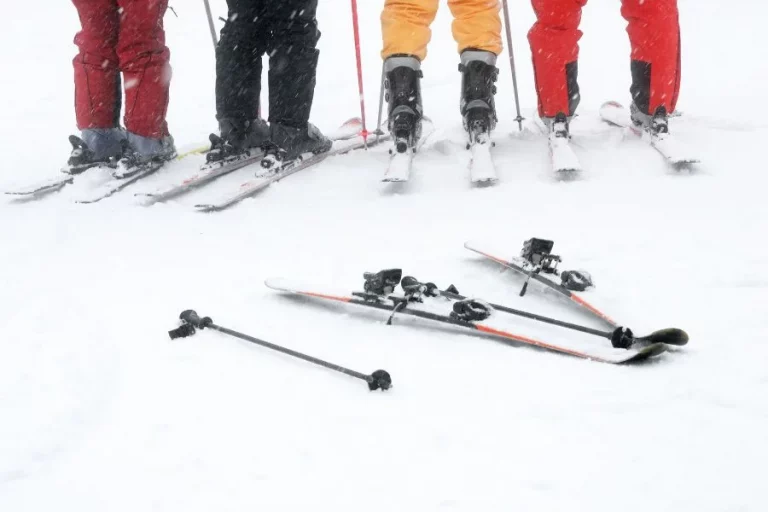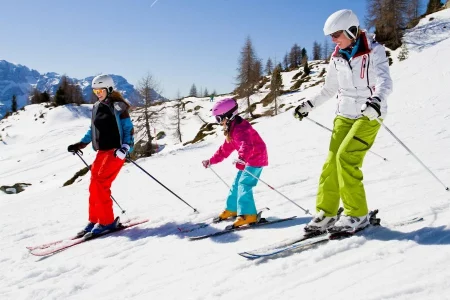Skiing is an exhilarating and rewarding experience but can be intimidating for newbies. With the right preparation and attitude, beginner skiers can make the most of their ski trips and create lasting memories with friends and family. To help get you started, here are five essential tips for beginner skiers to make the most of their ski trip. By following these tips, you can quickly learn the basics of skiing and enjoy the slopes with confidence. From checking your gear to taking lessons, these tips will ensure you have all the information you need to make your ski trip a success.
1. Check Your Gear: Essential ski equipment and its importance
Before you head out on the slopes, make sure you have all the essential ski equipment with you.
Ski boots – You’ll need to try your ski boots on before you go skiing, as you won’t be able to try them on once you’re on the slopes. Ski boots are designed to fit snugly and comfortably to provide maximum stability on the slopes. To choose the right size, stand with your feet parallel and your toes touching the wall.
Ski poles – Ski poles are essential pieces of equipment for skiing. They provide stability and help with balance when skiing. Beginners should use ski poles that collapse down, so they can easily be put away when they’re not using them.
Gloves – Gloves can be worn to keep your hands warm on the slopes. While waterproof gloves are best for extreme cold, warm gloves provide more flexibility.
2. Take Lessons: Benefits of taking skiing lessons
Taking skiing lessons is an excellent way to get started with the sport and can be very beneficial for all levels of skiers. Besides helping you improve your technique, taking lessons will also help you learn the language of skiing. This means you can communicate with other skiers on the slopes and share tips and advice. Since taking lessons is a great way to learn the basics of skiing, you’ll also be able to make new friends and have a safe and fun experience on the slopes. What’s more, taking skiing lessons can reduce your risk of injury by up to 40% compared to skiers who don’t take lessons.
3. Set Goals: Establishing realistic goals for your skiing experience
Whether you’re a complete beginner or you’ve skied before, it’s a good idea to set yourself some goals for your skiing experience. First, you should decide which type of skiing you want to do. There are three basic types of skiing:
Alpine skiing – Alpine skiing is a form of downhill skiing where you can reach high speeds on groomed runs. Cross-country skiing – Cross-country skiing is a form of skiing where you can enjoy the outdoors while still being able to see the beautiful landscape around you.
Nordic skiing – Nordic skiing is a form of cross-country skiing where you use two poles to glide along on a long, flat stretch of snow. By deciding which type of skiing you want to do, you can set realistic goals for your skiing experience.
4. Listen to Advice: Learning from more experienced skiers
Asking others for advice is a great way to learn about skiing and improve your technique. It’s a common practice for skiers to share tips and offer advice to beginner skiers. Besides asking your friends and family for advice, you can also seek advice from more experienced skiers.
Ski instructors – Ski instructors are trained professionals who can help you improve your technique and learn the basics of the sport. Ski instructors will help you choose the right equipment and will also provide tips and advice for improving your skiing experience.
Ski rental shops – Ski rental shops are a great place to ask for advice and tips for skiing. Many shops employ experienced skiers who are happy to share advice and tips.
5. Be Patient: How to enjoy the slopes despite making mistakes
As a beginner, you’re bound to make a few mistakes while skiing. However, it’s important to stay calm and try to learn from these mistakes. If you fall, stay on the ground until you’re ready to get up. Avoid rushing to get back up; this can cause more injury if you’re not steady on your feet. If you’re struggling with skiing, try to stay on the blue runs for a while. Avoid going too fast, as this will only increase your chance of injury. When you feel ready to progress, you can move on to the black runs, which are more challenging.
6. Stay Hydrated: The importance of staying hydrated on the slopes
When you’re on the slopes, it’s important to stay hydrated. The air at higher altitudes can be very dry, which can cause dryness in your mouth, nose, and eyes. This can leave you feeling uncomfortable and affect your skiing experience. Drinking water while on the slopes is an essential part of a skier’s diet. While skiing, you will sweat, which causes you to lose water from your body. Stay hydrated to avoid headaches and an uncomfortable dry mouth. The best way to stay hydrated while skiing is to bring a water bottle with you. Make sure to also wear sunscreen when skiing, as the UV rays can be harmful when skiing at high altitudes.
7. Be Smart: Tips for safety on the slopes
Before you head out on the slopes, it’s important to get all your equipment checked and properly fitted. Make sure your ski boots are the correct size and have room for your toes to wiggle. Your ski boots should be snug and comfortable. Before heading out on the slopes, you can practice your skiing skills in the safety of a ski slope parking lot. Use the stairs as a way of getting familiar with your skis and how to move with them. Taking these safety precautions will help you avoid injury on the slopes and have a safer and more enjoyable skiing experience.
8. Have Fun: Making the most of your ski trip
Finally, as with any new experience, it’s important to enjoy your ski trip. Whether you’re a complete beginner or have skied before, it’s important to have fun and enjoy the experience. Spending time with loved ones, exploring new places, and challenging yourself are all great ways to make the most of your ski trip. While there are many tips for beginner skiers, the most important thing is to enjoy the experience. If you follow these tips for beginner skiers, you’re sure to make the most of your ski trip. From checking your gear to staying hydrated, these tips will help you enjoy the slopes with confidence.

